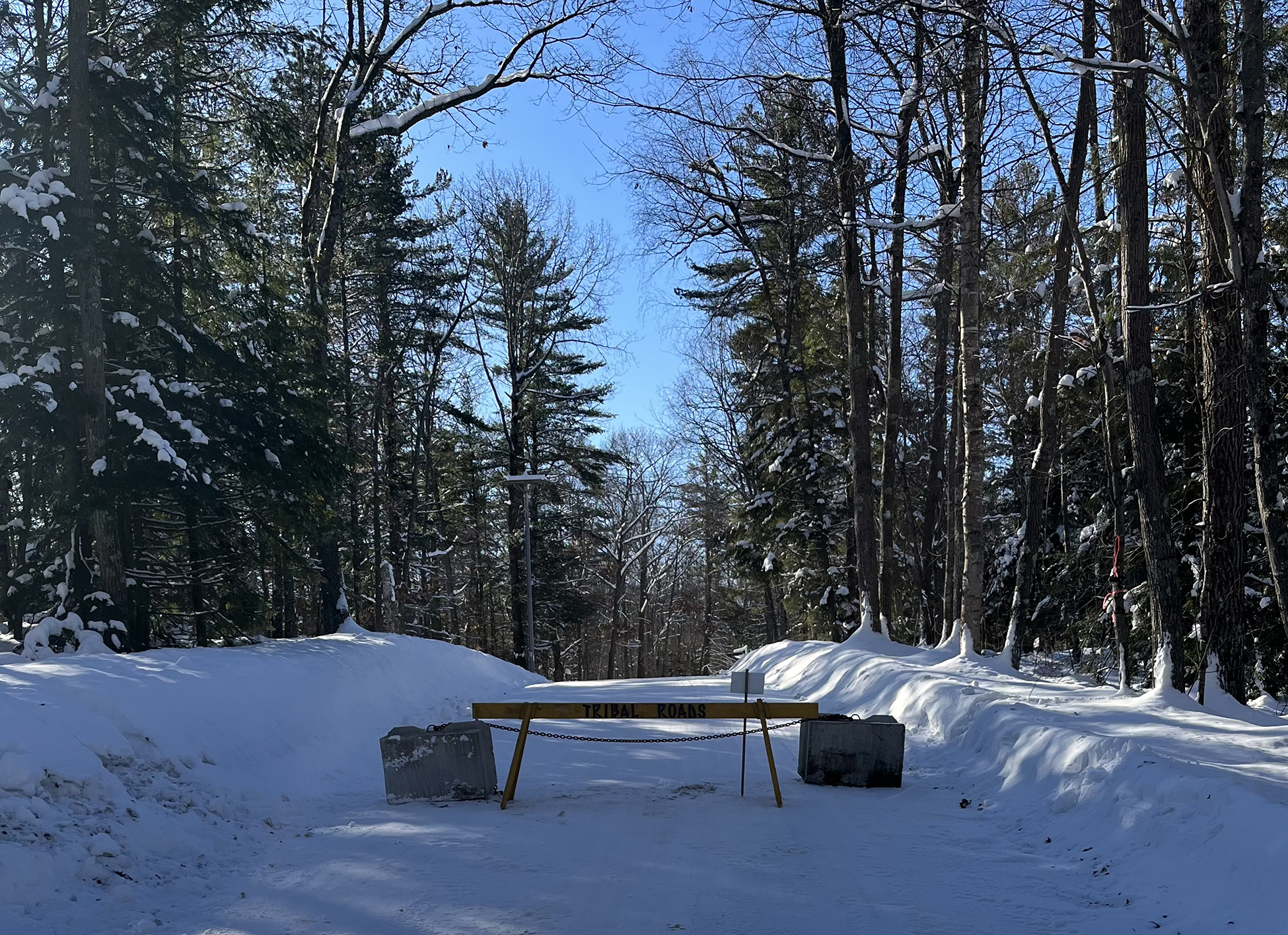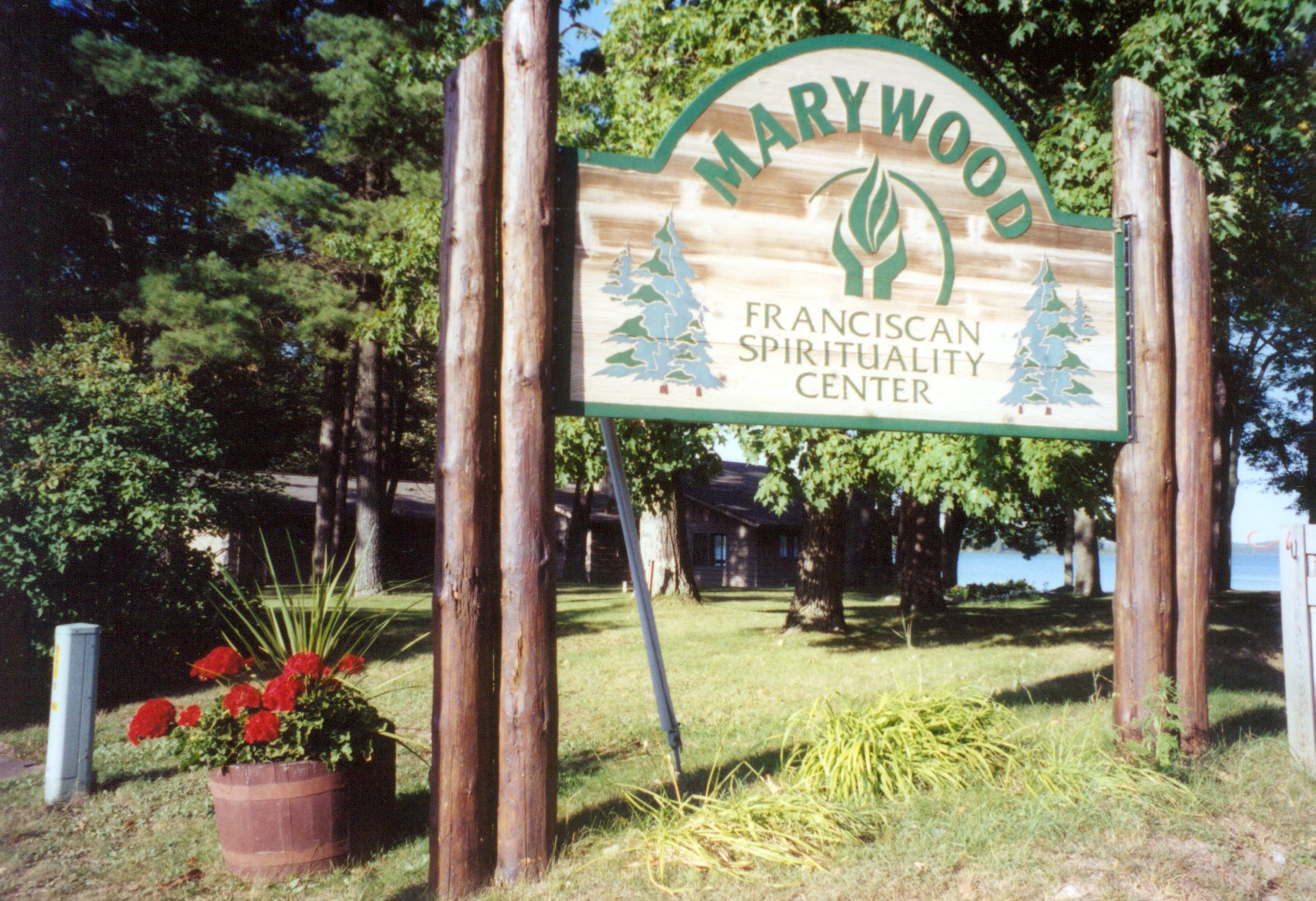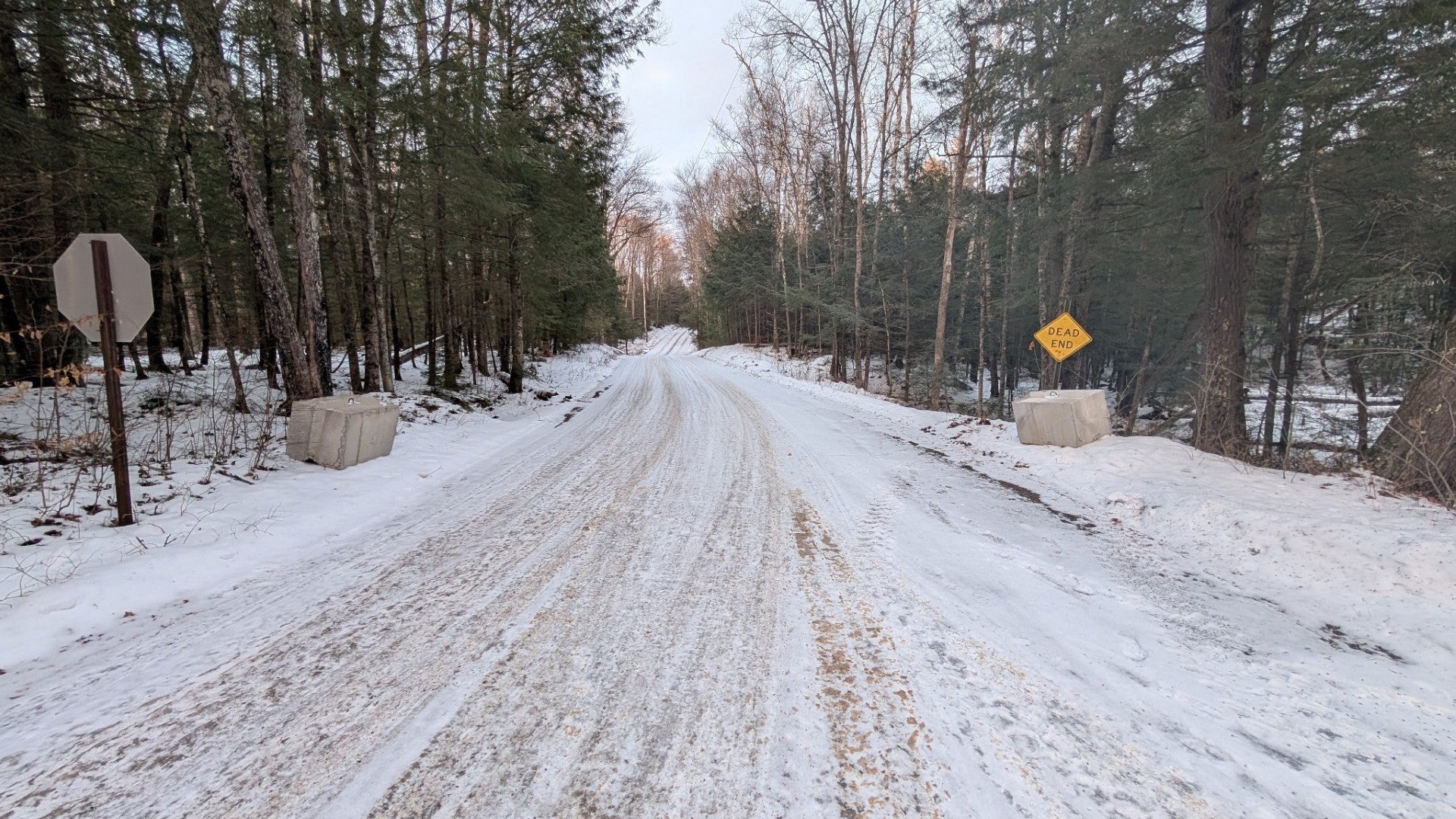Mary Possin, 65, and her husband John Disch, 68, have been using a snowmobile or snowshoes to travel across Elsie Lake to access their vehicles after the Lac du Flambeau tribe barricaded the road to their home.
“We have a somewhat treacherous path knocked out that’s solely on private land, so we’re not trespassing on tribal land to also reach our vehicles,” Possin said. “Once the ice becomes unsafe here — which with the weather we’re getting, we don’t know when that’s gonna happen, but it’ll be soon.”
On Jan. 31, residents living along Center Sugarbush Lane, East Ross Allen Lane, Elsie Lake Lane and Annie Sunn Lane had access to and from their homes blocked by an order of the Lac du Flambeau Tribal Council. The closures were the culmination of failed negotiations over right-of-way easements for the roads, which expired roughly a decade ago.
News with a little more humanity
WPR’s “Wisconsin Today” newsletter keeps you connected to the state you love without feeling overwhelmed. No paywall. No agenda. No corporate filter.
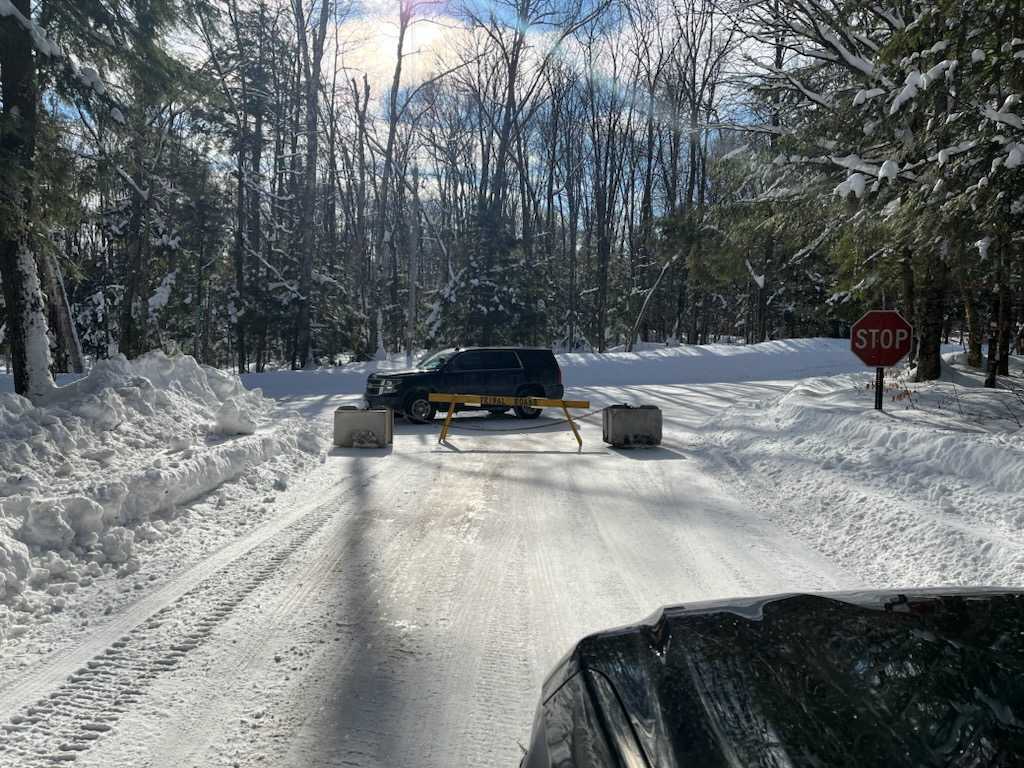
Since then, state and federal lawmakers have weighed in on the controversy by way of formal letters and statements. On Feb. 8, Democratic U.S. Sen. Tammy Baldwin and Gov. Tony Evers expressed “serious concerns” in a joint letter to the heads of the U.S. Department of Interior and Bureau of Indian Affairs.
“It is vital that the Bureau of Indian Affairs (BIA) act immediately to facilitate negotiations between the respective parties and work towards a prompt resolution,” the letter said.
A prior statement from the Lac du Flambeau tribe blamed the communication breakdown on the BIA, title companies and the Town of Lac du Flambeau Board of Supervisors. It said inaction by those parties reflect “an utter lack of recognition of the Lac du Flambeau Tribe, as a sovereign nation.”
Evers and Baldwin’s letter pulled no punches and demanded action from the federal agency.
“This is unacceptable, and we expect immediate engagement from BIA to aid in negotiations,” the letter said. “To that end, we also request that you facilitate prompt sharing of appraisal information as part of the negotiation.”
On Thursday, the tribe issued a new public statement that said it was seeking $20 million to secure 25-year easements for road access across reservation land. That figure, the statement said, accounts for all fees and expenses incurred by the tribe as it worked to secure an agreement, along with 10 years of illegal use of the roads.
“The Tribe feels for the property owners impacted by the actions of the Town and the Title Companies,” the statement said. “In fact, we share in their frustration and can relate. We’re hearing many property owners feel like the Town and the Title Companies misled them and are currently running them around in circles rather than solving the matter.”
During a Wednesday meeting of the Lac du Flambeau Town Board, the room was full of residents who waited along with dozens more on a video conferencing call, as members went into closed session to discuss their next step. When they returned, the board stated Board Chair Matt Gaulke would hand-deliver a letter to Tribal President John Johnson.
The letter, which was made public after the meeting, states the town was “assured that the title insurance companies were engaging in active communication and efforts to negotiate renewals of the easements for roads” and was never asked to participate in the negotiations or provide compensation related to the easements.
In a statement sent to the Green Bay Press-Gazette, Attorney Bridget Hubing of Reinhart Attorneys at Law, who is representing the title companies and landowners, said when a resolution on ownership of the roads couldn’t be reached, her clients contacted the BIA, which stated right-of-way easements for the roads would cost $25,000 each.
The U.S. Department of Interior, which houses the Bureau of Indian Affairs, didn’t immediately respond to a request for comment Friday.
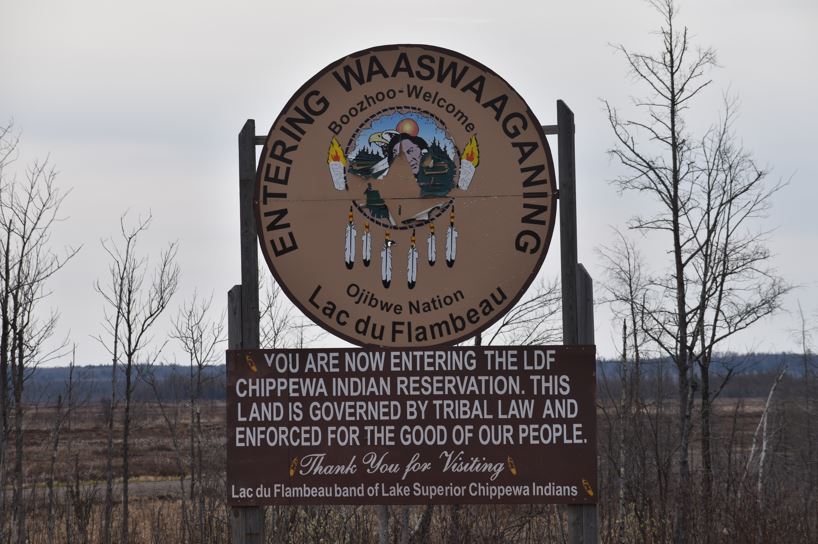
1887 federal law created problems for tribes that persist today
In the meantime, Possin said tribal police have been very courteous and empathetic toward her and her husband. They’re delivering groceries, medication and propane to property owners. The tribe lets them leave through the barricades, but getting back home is more difficult.
The Lac du Flambeau tribe is allowing people to come and go for ambulance, fire, rescue, road maintenance, mail and food delivery. However, people can’t leave and return to get to and from work.
While respectful of the tribe’s sovereignty, Possin said she feels more anger toward the town. She wants town leaders to make a significant offer to the tribe for financial compensation on the expired easements.
“I think it’s part of the problem in northern Wisconsin, in general, with people’s attitudes towards the tribe is that they don’t understand and appreciate the history that got us to where we are right now,” Possin said. “The Dawes Act and the allotment of Indian land is why we are here right now.”
Congress passed the Dawes Act, or the General Allotment Act, in 1887. Under the law, the president was authorized to break up and parcel out reservation land to individual tribal members. The policy was later reversed, but not before many lands fell out of tribal ownership. The Lac du Flambeau tribe, like others, doesn’t own all the land within its reservation.
Tom Maulson is a member and former president of the Lac du Flambeau band who said the Dawes Act caused major problems for tribes that persist today. He said he was involved with a road closure tied to an easement dispute decades ago.
While Maulson said he believes the $20 million request from the tribe is exorbitant, it serves as an “eye-opener for some of the landowners that have gone across Indian land to get to their piece of the property.”
“And it’s just the start of a snowball rolling up to where it’s big enough for people to see that they’ve got a clear this one way or the other,” he said.
Maulson said the current dispute is an opportunity for the town and state to share some of the property tax revenues from the residences and roads with the tribe.
Richard Monette is a law professor and director of the Great Lakes Indian Law Center at the University of Wisconsin-Madison. He said there’s a myriad of legal issues at play with easement disputes. He said a federal law — which he believes is unconstitutional — passed in 1953 known as PL280 gave states like Wisconsin concurrent jurisdiction on criminal and civil court cases on top of preexisting tribal jurisdiction.
“So in other words, if we have a trespass suit here, both the tribal court and the state court can hear it,” Monette said. “Well, OK, that’s a problem.”
Monette said the Wisconsin Supreme Court weighed in on the paradox and issued what is known as the Teague Protocol, which lists factors determining which court should exercise jurisdiction in criminal or civil cases. One of those is which court a criminal or civil action is filed in first.
Another issue, said Monette, is that federal law doesn’t give Wisconsin jurisdiction over regulatory disputes on tribal lands.
“And so all the parties should sort of understand that the tribe is largely in the driver’s seat regarding those regulatory issues,” Monette said.
Monette said there are faults with all parties in the Lac du Flambeau road access dispute, but the bulk of the blame lands with the BIA. He questioned how the agency hasn’t acted on easements that expired more than a decade ago.
Still, he said some fault lies with the tribe, and that had it established a property records office, title companies would be able to work more directly with them rather than relying on the BIA.
Wisconsin Public Radio, © Copyright 2025, Board of Regents of the University of Wisconsin System and Wisconsin Educational Communications Board.

